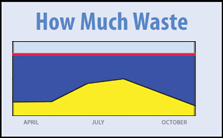Comets No Longer Thought to be Source of Earth's Water
The mystery of where Earth’s water came from got murkier recently when some astronomers essentially eliminated one of the chief suspects: Comets.
Over the past few months, the European Space Agency’s Rosetta space probe closely examined the type of comet that some scientists theorized could have brought water to our planet four billion years ago.
The probe found water, but it was the wrong kind. It was too heavy. One of the first studies from the Rosetta mission found that the comet’s water contains more of a hydrogen isotope called deuterium than water on Earth does.
“The question is, who brought this water (to Earth): Was it comets or something else?” asked Kathrin Altwegg, of the University of Bern in Switzerland, and lead author of a study published in the journal Science.
Probably asteroids, Altwegg concluded, though others disagree.
Many scientists have long believed Earth had water when it first formed, but then it boiled off, so that water now on the planet must have come from an outside source.
In 1980, a spacecraft came within 640 kilometres of Halley’s Comet, an Oort Cloud comet, and analysed the water. It proved to be heavier than Earth’s water.
But three years ago, other scientists examined the water in a Kuiper Belt comet, Hartley 2, and it was a perfect match for Earth’s water.
However, Altwegg says the water of the Kuiper Belt comet visited by the Rosetta mission was even heavier than Earth’s water, which only goes to show that Kuiper Belt comets aren’t as uniform as once thought.


